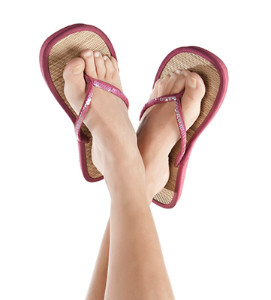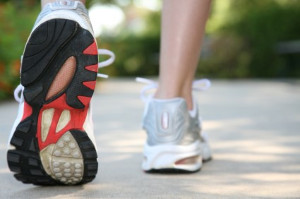We practice a minimally invasive approach to your foot or ankle problem with surgery as the last option
 While flip-flops may be convenient to wear around the pool and locker rooms, they should not be worn for long periods of time. The only benefit that these shoes provide is that they can help protect you from infection, but they tend to do more harm than good for your feet. Typically, flip-flops fail to provide your feet with arch support, which may cause your natural foot arch to collapse. As a result, other parts of your body, such as your hip and back, may be disrupted. Nevertheless, the key to wearing flip-flops is moderation. It is crucial that you only wear these shoes for short periods of time in order to prevent long-term damage to your feet.
While flip-flops may be convenient to wear around the pool and locker rooms, they should not be worn for long periods of time. The only benefit that these shoes provide is that they can help protect you from infection, but they tend to do more harm than good for your feet. Typically, flip-flops fail to provide your feet with arch support, which may cause your natural foot arch to collapse. As a result, other parts of your body, such as your hip and back, may be disrupted. Nevertheless, the key to wearing flip-flops is moderation. It is crucial that you only wear these shoes for short periods of time in order to prevent long-term damage to your feet.
Flip-flops are not always the best choice of footwear. If you have any concerns about your feet or ankles, contact Dr. David Ungar from Personal Foot Care. Our doctor will assist you with all of your foot and ankle needs.
Flip-Flops and Feet
When the weather starts warming up, people enjoy wearing flip-flops. Flip-flops are comfortable, stylish, and easy to slip on and off; they're perfect for any summer beach goer. However, these shoes can cause harm to the feet.
How Can Flip-Flops Affect Me Long-Term?
Are There Injuries Associated with Flip-Flops?
Yes. Since flip-flops are relatively weak and do not provide the same amount of support as sneakers, people who wear flip-flops regularly are more susceptible to injuries. On top of that, the open nature of the shoe makes your feet more prone to other problems, such as cuts and even infections. Common injuries and ailments include:
I like Wearing Flip-Flops. Are There Safe Alternatives?
When buying flip-flops, try to find ones that have sturdy soles and that are made of high-quality materials that will support for your feet. These flip-flops will cost more but will also last longer as a result.
If you have any questions please feel free to contact our office located in Farmington, MI . We offer the newest diagnostic and treatment technologies for all your foot and ankle needs.
 It is very important that you take precautions prior to starting your running routine. Running injuries can happen easily due to running too much too soon, or by wearing the wrong shoes. Poorly fitting running shoes have the potential to cause blisters, corns, and calluses; this is why it is advised to try on your shoes prior to wearing them to make sure they fit properly. When you are looking for a new running shoe it is important that the ball of your foot matches where the shoe bends. Furthermore, you should replace your running shoes on a regular basis. The average life of a running shoe is 350 to 500 miles, but if you are a heavy runner, you may need to replace them even sooner.
It is very important that you take precautions prior to starting your running routine. Running injuries can happen easily due to running too much too soon, or by wearing the wrong shoes. Poorly fitting running shoes have the potential to cause blisters, corns, and calluses; this is why it is advised to try on your shoes prior to wearing them to make sure they fit properly. When you are looking for a new running shoe it is important that the ball of your foot matches where the shoe bends. Furthermore, you should replace your running shoes on a regular basis. The average life of a running shoe is 350 to 500 miles, but if you are a heavy runner, you may need to replace them even sooner.
Exercising your feet regularly with the proper foot wear is a great way to prevent injuries. If you have any concerns about your feet, contact Dr. David Ungar of Personal Foot Care. Our doctor will treat your foot and ankle needs.
How to Prevent Running Injuries
Many common running injuries are caused by overuse and overtraining. When the back of the kneecap starts wearing out and starts causing pain in your knee, this is commonly referred to as runner’s knee. Runner’s knee is a decrease in strength in your quadriceps and can occur if you’re not wearing properly fitted or supporting shoes. To prevent runner’s knee, focusing on hip strengthening is a good idea, as well as strengthening your quads to keep the kneecaps aligned.
What Are Some Causes of Running Injuries?
- One cause of a common running injury is called iliotibial band syndrome.
- Plantar fasciitis is also another common injury.
- Stress fractures can occur from overtraining, lack of calcium, or even your running style.
Best Ways to Prevent Running Injuries
- Wear footwear that fits properly and suits your running needs.
- Running shoes are the only protective gear that runners have to safeguard them from injury.
- Make a training schedule. Adding strengthening exercises as well as regular stretching can help keep you strong and limber and can lessen the possibility of injuries.
- Stretching keeps muscles limber; this will help you gain better flexibility.
If you have any questions please feel free to contact our office located in Farmington, MI . We offer the newest diagnostic and treatment technologies for all your foot and ankle needs.
Connect With Us
